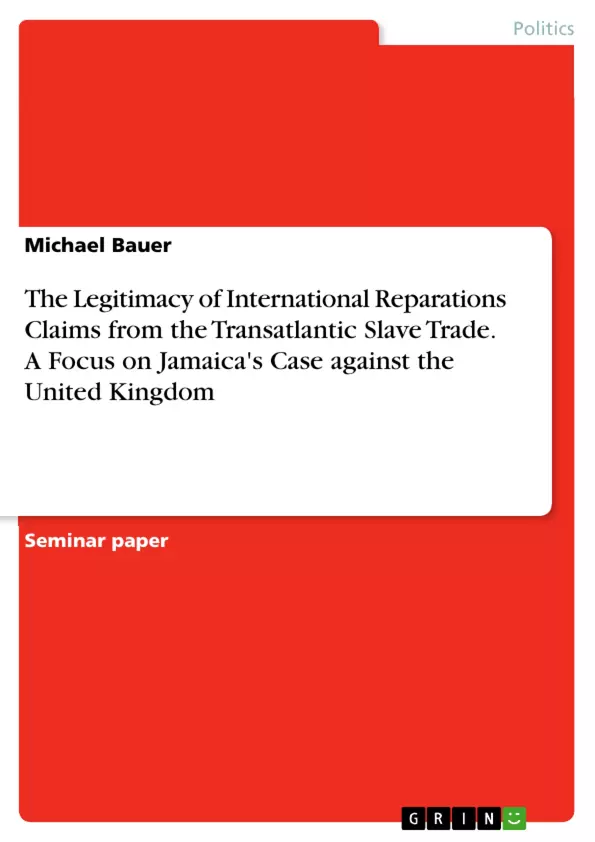In this paper I want to outline the discourse of legitimacy of international reparations claims resulting from the Transatlantic Slave Trade, exemplified by the case of Jamaica, the former British colony, on the one hand, and the United Kingdom on the other. For a better understanding, we will start with a brief historical outline of what reparations are in the first place and why they are suitable to function as an act of reconciliation for historical wrongs. In the following, we will look specifically at the case of Jamaica's reparation claims against Great Britain, whereby Jamaica is not acting alone, but in conjunction with other Caribbean states. In doing so, we will trace what exactly Jamaica and other CARICOM countries are demanding reparations for and how they justify it. In the course of this, the question will logically arise as to why Great Britain has not complied with these well-founded demands to date, which is why the counterarguments will be examined more closely in the fourth chapter. This will be followed by a brief look into the future, with an assessment of how the British government could most likely be persuaded to engage with the reparation demands.
Inhaltsverzeichnis (Table of Contents)
- Introduction
- Reparations as an Act of Reconciliation in Historical Perspective
- Development and Strategy of Jamaican Reparations Claims against Britain for the Transatlantic Slave Trade
- Dealing with counterarguments
- Conclusion
Zielsetzung und Themenschwerpunkte (Objectives and Key Themes)
This paper aims to analyze the discourse surrounding international reparations claims resulting from the Transatlantic Slave Trade, using the case of Jamaica and the United Kingdom as an example. It explores the legitimacy of these claims, examining the historical context, the arguments put forth by Jamaica and other Caribbean states, and the counterarguments presented by the United Kingdom. The paper also delves into the potential for future engagement and reconciliation between the two nations.
- The historical context and lasting effects of the Transatlantic Slave Trade
- The arguments presented by Jamaica and other Caribbean states in support of reparations claims
- The counterarguments and justifications offered by the United Kingdom
- The potential for future engagement and reconciliation between Jamaica and the United Kingdom
- The legal and ethical implications of reparations for historical injustice
Zusammenfassung der Kapitel (Chapter Summaries)
- Introduction: This chapter provides an overview of the topic, highlighting the enduring legacy of slavery and the need for addressing historical injustices. It emphasizes the importance of reparations as a means of reconciliation and acknowledges the ongoing debate surrounding the issue.
- Reparations as an Act of Reconciliation in Historical Perspective: This chapter examines the concept of reparations in a historical context, exploring various examples of its use as a means of addressing past wrongs. It discusses the rationale behind reparations and its potential to promote reconciliation and social justice.
- Development and Strategy of Jamaican Reparations Claims against Britain for the Transatlantic Slave Trade: This chapter focuses on the specific case of Jamaica's reparation claims against the United Kingdom. It outlines the key demands made by Jamaica and other CARICOM states, highlighting their justifications and the historical evidence presented in support of their claims.
Schlüsselwörter (Keywords)
The main keywords and focus topics of this paper include: Transatlantic Slave Trade, reparations, Jamaica, United Kingdom, historical injustice, reconciliation, colonialism, slavery, Caribbean, CARICOM, counterarguments, legitimacy, ethical implications, legal justifications, development, underdevelopment, exploitation, social justice, and human rights.
- Arbeit zitieren
- Michael Bauer (Autor:in), 2022, The Legitimacy of International Reparations Claims from the Transatlantic Slave Trade. A Focus on Jamaica's Case against the United Kingdom, München, GRIN Verlag, https://www.hausarbeiten.de/document/1441686


